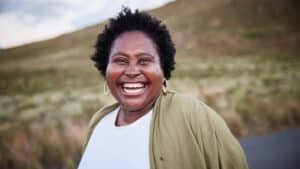
A book about a death doula sounds pretty morbid. But I’m here to say that The Collected Regrets of Clover by Mikki Brammer is anything but. It is an uplifting read with themes and wisdom of living well abounding throughout.
Yes, there is much to say about grief and dying. And there is also much to say about what goes into living a good life.
As a Society, We Don’t Do Grief Well
We shy away from talking about death. We are uncomfortable around other’s pain and sadness and, therefore, don’t come too close to a subject that is just that. So, we need to normalize grief as not something wrong but something so right when a loved one has died. Tears of grief are an expression of love and connection. And yes, sometimes ambiguous feelings are present as well: guilt, unhealed trauma, estrangement, ambivalence; and yes, those can be quite difficult to work through.
This is part of our life cycle. We need to get better at grief and become more open around this topic so we can better support our loved ones in their time of pain. Our discomfort and our shying away from discussing death and grief only creates loneliness and more disconnect from others in pain whose need is to be listened to and understood.
Death cafes were started, and are currently all over, for just this reason: to talk about anything related to the subject of death and dying. You can hear conversations on the concrete matters of writing wills and funeral arrangements, as the more self-examined thoughts such as what goes into living a good life and coming to the end with fewer regrets.
A Perfect Life? Not at All
A well-lived life doesn’t preclude challenges, problems and difficulties. In fact, we grow from working through our issues, from disappointment and rejection, from loss and pain. Transcending our circumstances and creating meaning are our food for strengthening our character and resilience. Beauty doesn’t come from perfection but rather from brokenness from which we regrow our new whole.
When a loved one dies, we carry our grief with us forever. Their missing piece does not get filled in. Rather we grow around the emptiness, expanding our lives with renewed purpose and meaning.
Being aware of our mortality informs our life with intention. It’s like the little birdie on our shoulder, keeping us on our toes of conscious living; living into what matters to us, what we value, and we can step into ourselves with greater awareness and excitement. We take and give with fierceness and a sense of urgency, not knowing when our time is up.
Back to the Book
The Collected Regrets of Clover brings to the forefront some great questions that can guide us forward. Here are a few:
- What makes life worth living for you?
- What are some of your regrets until now?
- How can you acknowledge your regrets and move beyond and perhaps do something differently?
- How can you step out of your comfort zone to be more of who you are and experience more of your life?
The saying goes: curiosity killed the cat; but curiosity really is a life opener. It opens us up to new opportunities, moves us towards new experiences and pushes us out of our status quo. We move with interest to new things, new ideas, new people, new information, and suddenly, life becomes our oyster with oh so much to take in and on. This is where zest and vibrancy show themselves.
Says Leo to Clover: “I’ve lived the hell out of my life and now it’s time for me to take the next exit.” Or as Thoreau said and was poignantly referenced in the movie Dead Poet Society, ” I wanted to live deep and suck out all the marrow of life.”
Are You Sucking the Marrow Out of Life?
When I was given my original horrific cancer pre-diagnosis two years ago, I lay in my hospital bed in the dark wee hours of the night, thinking through my tears of wanting more life, that I had lived my life with great intent, and that despite numerous hardships, had grown my life into a well-lived legacy. I then proceeded to make my mental lists of all I had gone through and all my wonderful riches of growth and change. (Note: A week later I was given a much better diagnosis of cancer.)
My marrow is getting a run for its money as I live now to pay forward my gift and renewal of life.
As Norman Cousins said, “Death is not the greatest loss in life. The greatest loss is what dies inside us while we live.”
Don’t let any of yourself die while alive. Step into your wonderful self. Work on healing the rough patches. Take pride in your self-work. This is where we transcend our circumstances and begin to feel joy from the inside out.
Let’s Have a Conversation:
Are you comfortable talking about death? If not, what makes you avoid it? Can you engage in discussions around this with your loved ones? If you do let it come into your purview of thoughts, how does it affect your living?





